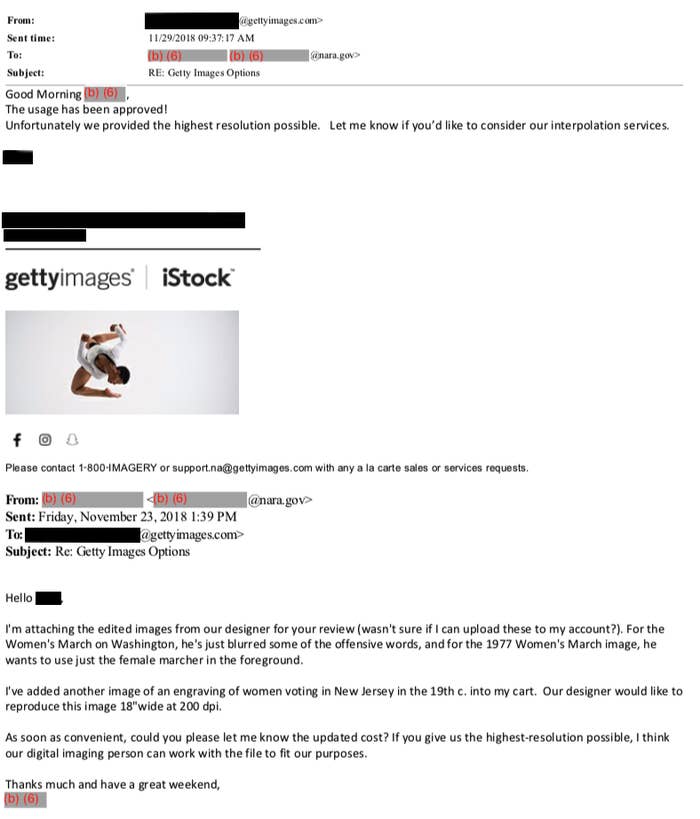A Getty Images representative signed off on the National Archives' alteration of a 2017 Women's March photo on display at the museum, according to emails released following FOIA requests by BuzzFeed News and other organizations.
The museum's decision to blur out protest signs critical of President Donald Trump in the photo at its women's suffrage exhibit sparked heavy criticism when Washington Post reporter Joe Helm spotted it in January. Documents released this week under the Freedom of Information Act show that a Getty employee reviewed and approved the edits prior to allowing the museum to use the image.
The Women's March, which was organized in part to protest the election of Trump in 2016, was widely considered to be one of the largest worldwide protests.
The National Archives used a photo of the march in its "Rightfully Hers" exhibit, but obscured Trump's name on a sign that said "God Hates Trump." Additionally, the words "vagina" and "pussy" were obscured in the photo, from signs that read "If my vagina could shoot bullets, it’d be less REGULATED" and “This Pussy Grabs Back.”
Though the museum initially said the photo was altered to avoid "political controversy," as the backlash grew, it later conceded it was a "mistake."
"This photo is not an archival record held by the National Archives, but one we licensed to use as a promotional graphic. Nonetheless, we were wrong to alter the image," the museum said. "We apologize, and will immediately start a thorough review of our exhibit policies and procedures so that this does not happen again."
Getty spokesperson Anne Flanagan confirmed at the time that the image, captured by photographer Mario Tama, was licensed to the museum, but said Getty was still determining if the company had approved any edits to it.
On Thursday, a spokesperson told BuzzFeed News that Getty's standard license, "does not allow modification of content with the exception of blurring obscenities for public display. In this case, NARA advised us that they wanted to blur certain obscenities in the image but did not indicate specifically what words they considered obscenities."
However, the emails released this week show that the altered Women's March photo was shared with a Getty Images representative who reviewed it before approving the museum's usage.
The exchange indicates that Getty approved the museum's obscuring of the words "vagina," "pussy," and "Trump" in the photo under its policy that allows the blurring of obscenities for public display.
"NARA advised us that they wanted to blur certain obscenities in the image. Getty Images approved the blurring of obscenities," the spokesperson added on Thursday.

While planning for the exhibit in 2018, one National Archives employee cautioned in an internal email that "any images we end up using should be carefully inspected for offensive signage."
In subsequent emails, a museum employee sent the Getty representative mockups of the edited photos and noted that the exhibit's designer "just blurred some of the offensive words" in the Women's March photo.
The Getty rep then responded, "The usage has been approved!"
A museum employee later noted that Getty "had to approve the small amount of photo editing I did to clean up some of the language and direct political references" in an email discussing the licensing of the company's photos.
Tama, the photographer, did not respond to a request for comment.
The museum has since replaced the altered image with an unedited one.
